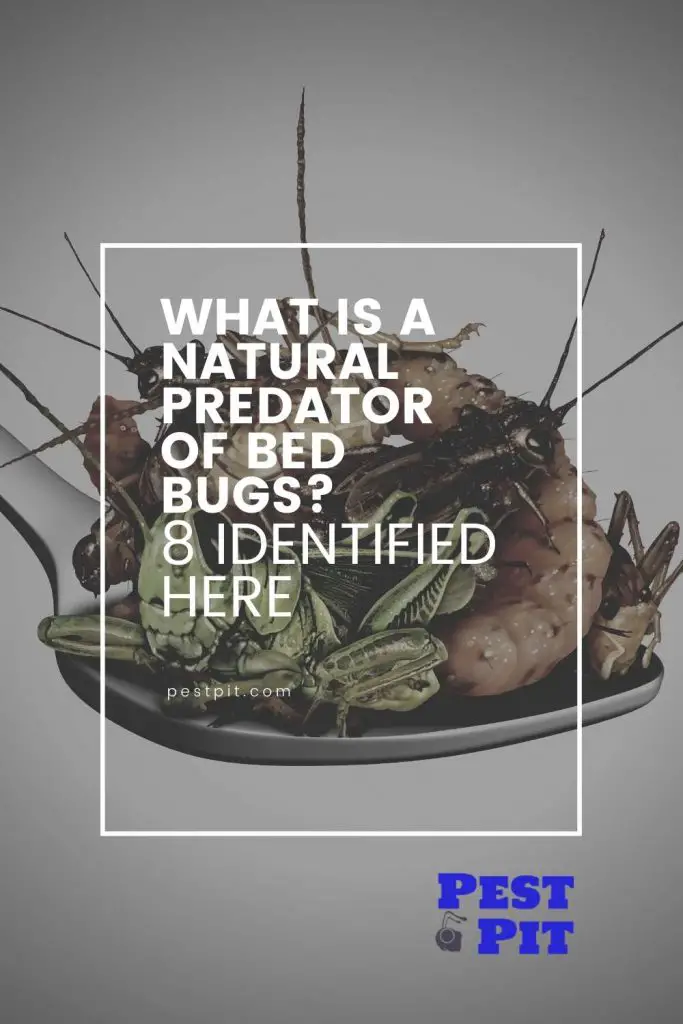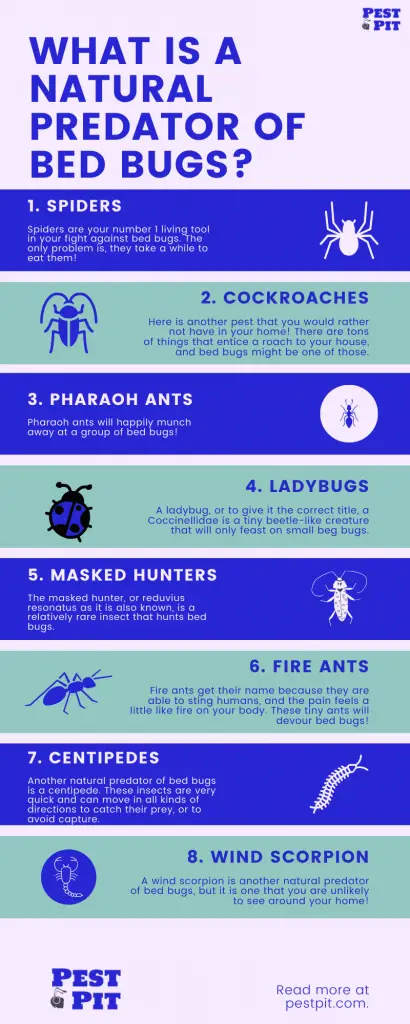It’s an intriguing question! Most of us know about bed bugs because they feed on us and sometimes on our pets.
What we don’t consider is what eats bed bugs?
Surely there must be some insects or animals that like to feast on bed bugs! In this post, we will look at whether there is a natural predator of bed bugs. Spoiler alert, bed bugs do have natural predators, and this post will give you 8 of them!
What you will learn in this post:
- What is a natural predator of bed bugs?

The 8 Most Common Natural Predators Of a Bed Bug
There is at least 1 natural predator of bed bugs. Let’s face it; there must be! We all have a part to play in the food chain; usually, it is the smaller creatures preyed on most of all.
Bed bugs vary in size and can be eaten by some predators, but usually not fully grown adults.
That means the adult bed bugs are left to give birth to hundreds more baby bed bugs.
Let’s take a look at the 8 most common:

1. Spiders
Spiders are your number 1 living tool in your fight against bed bugs. The only problem is that they take a while to eat them! Plus, it is no good if you fear spiders!
A spider will wrap a bed bug up in its web before sucking all of the goodness out and leaving the carcass on your bed.
When you think about spiders killing bed bugs, it does send a shudder of fear through many folks. Consider this: bed bugs are in your bed (the clue is in the name), which means for a spider to eat the bed bugs, you guessed it, the spider needs to be in your bed.
2. Cockroaches
Here is another pest that you would rather not have in your home! Many things entice a roach to your house, and bed bugs might be one of those.
A dirty house will attract all kinds of creatures, including bed bugs and cockroaches. You may not see it as good news, but cockroaches will happily feast on bed bugs.
It does mean you will also have cockroaches in your bed.
3. Pharaoh Ants
Pharaoh ants will happily munch away at a group of bed bugs!
These ants can be found worldwide but prefer to live in a tropical climate. If your climate is not tropical, you may still get them. They will be attracted to your home because of the central heating system.
4. Ladybugs
A ladybug, or to give it the correct title, a Coccinellidae, is a tiny beetle-like creature that will only feast on small beg bugs.
Fully size bedbugs are too big for a ladybug to eat to concentrate on only the smaller bugs.
Again, if you plan to use a predator to kill all the bed bugs, there is no point in using a ladybug, you would need a lot of them, and they would leave the bigger ones to give birth to more baby bed bugs!
5. Masked Hunters
The masked hunter, or reduvius resonatus as it is also known, is a relatively rare insect that hunts bed bugs.
They are called the ‘masked’ hunter because they cover themselves in some dust to lower the chances of being spotted. Dust acts as their mask!
If you do come across these creatures, be careful! While they do not feed on human blood, the bite of a masked hunter can be excruciating.
6. Fire Ants
Fire ants get their name because they can sting humans, and the pain feels like a fire on your body. These tiny ants will devour bed bugs!
As with all of the bed bug predators on this page, they will need to go into your bed to eat the bed bugs, so I am not sure what is worse!
7. Centipedes
Another natural predator of bed bugs is a centipede. These insects are swift and can move in all directions to catch their prey or avoid capture.
The size of a centipede can range from less than 1 inch to over 10 inches! Thankfully, the bigger centipedes live in the Amazonian region.
Most centipedes are under 1 inch long, and these will usually only consume smaller bed bugs, leaving the larger bed bugs to give birth to hundreds of new ones!
8. Wind Scorpion
A wind scorpion is another natural predator of bed bugs, but it is one that you are unlikely to see around your home!
This scorpion is also known as a camel spider and is found in many parts of the world, including the US, Africa, and Canada.
Conclusion
So, to recap, what is a natural predator of bed bugs? Ants (pharaoh and fire), masked hunters, spiders, cockroaches, ladybugs, centipedes, and wind scorpions. Creatures that will hunt, kill, and eat bed bugs.
While it is interesting to know what the natural predators are for bed bugs, I don’t think you will want to use any of those in your fight to get rid of them!
You will not want to add any of the predators into your bed to combat the bed bug infestation for a start. Secondly, these predators will take far too long to feast on the whole infestation of bed bugs!
There are much better ways of getting rid of bedbugs, such as:
- Using eucalyptus oil for bed bugs
- Using lavender for bed bugs
You can also use a steam cleaner or iron for instance… anything that gets hot enough to kill the bed bugs but doesn’t cause a fire!
Getting rid of bed bugs on your carpet can be challenging but not impossible. Also, if you have them on your mattress, there are other ways to get rid of them.
Ultimately, you should always ensure that you live in a clean home, especially your bedroom. This limits the chances of getting bed bugs in your home.
Good luck!

